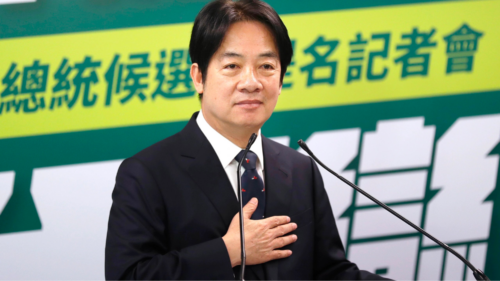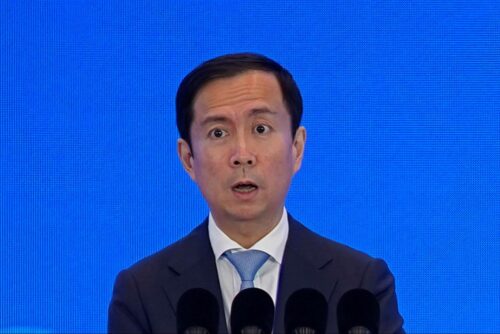U.S. blocks sale of MoneyGram to Jack Ma company
Concerns over control of the private data of American citizens have scuttled a $1.2 billion deal. This is a blow to the Alibaba empire’s global expansion plans, as U.S. regulators increase scrutiny of Chinese acquisitions, while American companies remain shut out of lucrative parts of the Chinese economy.


Whether it is a demand for reciprocity in market access or national security concerns, Washington, D.C., is hardening its attitude to Chinese takeovers of significant American companies.
The latest victim? Alibaba affiliate Ant Financial, whose “plan to acquire U.S. money transfer company MoneyGram International collapsed on Tuesday after a U.S. government panel rejected it over national security concerns, the most high-profile Chinese deal to be torpedoed under the administration of U.S. President Donald Trump,” according to Reuters.
- The deal was worth $1.2 billion. Reuters says the deal’s failure “represents a blow for Jack Ma, the executive chairman of Chinese internet conglomerate Alibaba Group, who owns Ant Financial together with Alibaba executives,” and will slow down Ant Financial’s global progress “amid fierce domestic competition from Chinese rival Tencent’s WeChat payment platform.”
- “The deal failed despite a charm offensive by Jack Ma, the Chinese internet tycoon who controls Ant Financial,” notes (paywall) the New York Times, adding that “shortly after Mr. Trump won the 2016 election, Mr. Ma famously stood with the president-elect in Trump Tower in New York and pledged that his e-commerce empire would help create one million American jobs.”
- The Committee on Foreign Investment in the United States (CFIUS) rejected Ant Financial’s and MoneyGram’s proposals to mitigate concerns over the safety of data that can be used to identify U.S. citizens, causing the companies to abandon the deal.
Aside from interested parties, there will be few tears shed in the American business community about the deal’s collapse — China’s financial sector remains extremely difficult for foreign investors to access, despite decades of promises from Beijing.
Censorship, surveillance, and privacy
The latest news from Big Brother and the Nanny State:
I'm on the Tianjin to Beijing train and the automated announcement just warned us that breaking train rules will hurt our personal credit scores!
— Emily Rauhala (@emilyrauhala) January 3, 2018
- WeChat and data privacy: Quartz examines the recent controversy in China about what Tencent does with data of WeChat users. The company says it does not store the chat history of users, but recent events show that private conversations are monitored by the government. The chairman of Geely, one of China’s biggest car companies, fueled the debate by complaining of the lack of privacy in WeChat, according to Asia Times.
https://twitter.com/hancocktom/status/948059009918967808
- Chinese people are balking “at using apps to snitch on neighbors,” says (paywall) the Wall Street Journal, because many “resent being forced to use a surveillance tool, or fear official retribution for voicing their concerns.”
- Toutiao troubles: As we noted in the last week of December, popular news app and investor darling Toutiao was punished with a suspension of services by Beijing internet authorities for distributing “vulgar” and “pornographic” content and “negatively impacting public opinion.” In reaction, Toutiao will hire 10,000 in-house censors, preferably Party members, according to TechNode. Radio Free Asia says Toutiao has also “suspended more than 1,000 accounts…for alleged breaches of regulations and for spreading ‘pornographic and vulgar content,’” and launched a channel called “New Era,” a reference to Xi Jinping Thought on Socialism with Chinese Characteristics for a New Era.
- Iran protests censored: China Digital Times says the government has instructed news media to cease further reporting on the demonstrations in Iran.
Chinese drugs are coming for your veins and more
Whether you look at the sheer number of elderly people and the spiking rates of diabetes and cancer, or at the country’s ambitious, well-funded pharmaceutical and biotech industries, there is no doubt that healthcare in China will be a major story in the coming years. See on The China Project:
- If you’re interested in China and healthcare, do read our Q&A with Roberta Lipson, whom we can confidently call the most successful foreign entrepreneur in China’s healthcare industry. She is the founder of New York Stock Exchange–listed company Chindex and its subsidiary chain of private hospitals in China.
What ails China’s healthcare system? Roberta Lipson has a detailed diagnosis
- Roberta is a speaker at Next China, our conference in New York on January 17 — a day of discussions with leaders in tech, business, journalism, and scholarship, about the ways China is going to mess with your worldview in 2018 and beyond.






